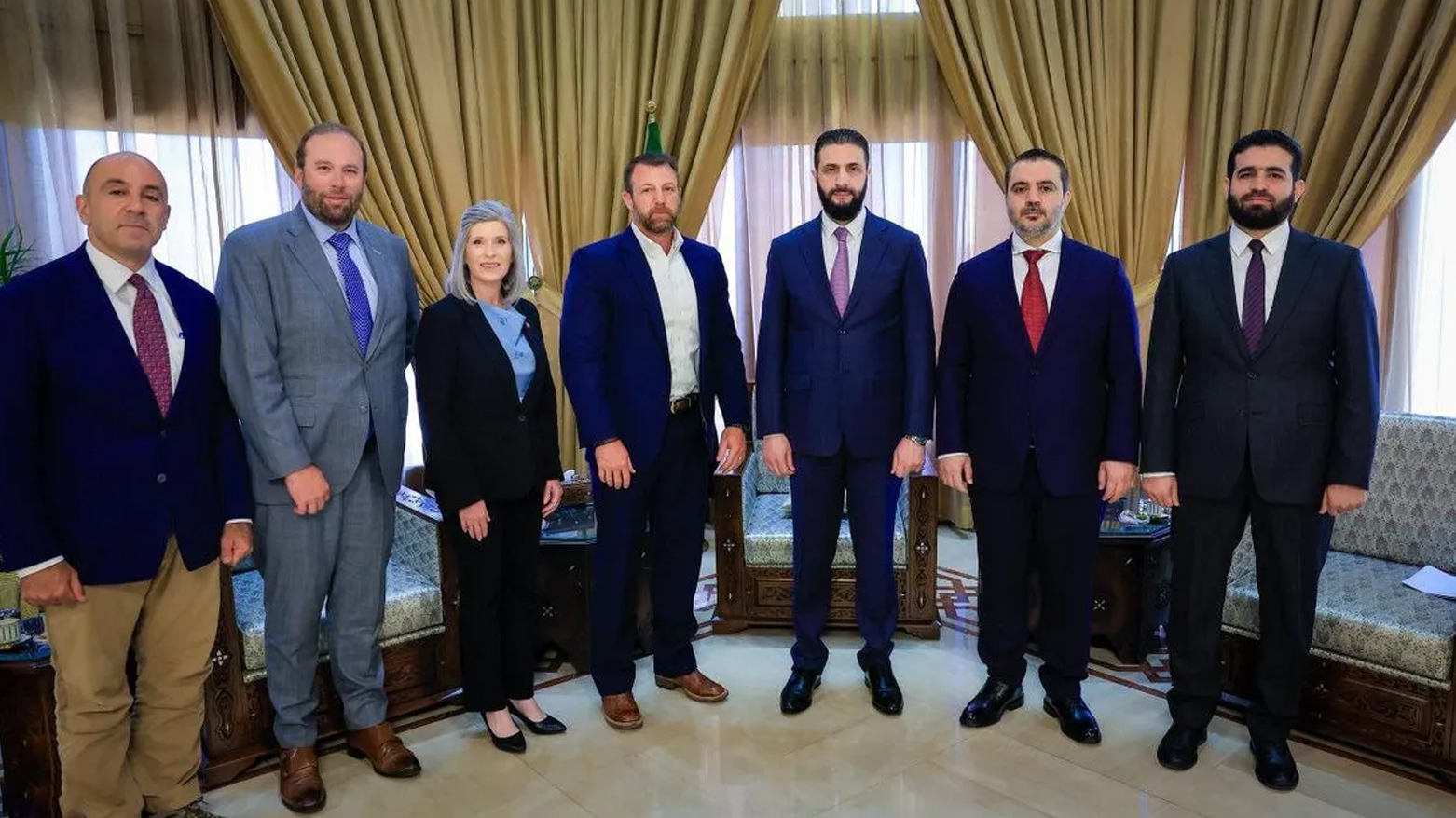Al-Sharaa Receives U.S. Congressional Delegation in Damascus amid Rising Diplomatic Shifts
Interim Syrian President al-Sharaa meets US Congressional delegation in Damascus, continuing diplomatic outreach. The visit follows his appointment of a new UN envoy and occurs amid internal unrest in Sweida and federalist proposals from Western Kurdistan.

ERBIL (Kurdistan24) – Syrian Interim President Ahmed al-Sharaa on Tuesday received a visiting delegation of members from the United States Congress in Damascus, in a meeting attended by senior Syrian officials including Foreign Minister Asaad Hassan al-Shibani and Interior Minister Anas Khattab, according to the Syrian Arab News Agency (SANA).
This latest encounter marks the second high-level American visit since April, when U.S. lawmakers first set foot in Syria following the collapse of the Assad regime. The renewed engagement comes at a moment of profound internal crisis and shifting political currents that continue to reshape the country’s future.
On Apr. 18, 2025, two Republican lawmakers—Representatives Cory Mills of Florida and Marlin Stutzman of Indiana, arrived in Damascus, marking the first congressional visit since Bashar al-Assad was ousted by an Islamist-led offensive in December 2024.
The two held a 90-minute meeting with President al-Sharaa, where discussions focused on U.S. sanctions, the role of Iran in Syria, and the prospects of rebuilding political ties. Their visit was coordinated by the Syrian American Alliance for Peace and Prosperity, a Washington-based advocacy group.
Syrian media reported that President al-Sharaa is preparing for a historic trip to the United States in September, where he is expected to address the United Nations General Assembly. If confirmed, this would be the first appearance by a Syrian head of state at the UN in six decades, a symbolic milestone in efforts to reintegrate Damascus into international diplomacy.
Al-Sharaa, who assumed office after Assad’s ouster, has launched a series of bold diplomatic initiatives aimed at repositioning Syria on the global stage. The anticipated address will be closely watched as a defining moment for the country’s post-war reintegration.
As part of these efforts, on August 19, 2025, al-Sharaa issued Decree No. 142, appointing Ibrahim Abdulmalik Olabi as Syria’s Permanent Representative to the United Nations in New York.
Olabi, a distinguished human rights lawyer with British and German citizenship, has built a career in international law and policy, earning recognition through advisory roles with the UN High Commissioner for Human Rights and the International Bar Association, as well as extensive fieldwork in Syria. His appointment is seen as a deliberate step to project a modern, internationally credible image of Syria’s new leadership.
Parallel to these diplomatic overtures, President al-Sharaa has issued uncompromising statements on Syria’s territorial unity. Speaking in Idlib on Aug. 17, 2025, he rejected any notion of partition, calling such proposals “impossible” and the product of “political ignorance.”
Al-Sharaa’s remarks came against the backdrop of escalating unrest in Sweida, where demands for independence have grown into mass demonstrations. According to the Syrian Observatory for Human Rights (SOHR), thousands have protested under the slogan “The Right to Self-Determination”, some raising Israeli and Druze flags, and demanding international intervention.
The protests, which began in late July after violent clashes between Bedouins and government forces, have spiraled into a humanitarian and political crisis. SOHR documented a staggering 1,677 deaths since July 13, including 452 Druze civilians—among them women, children, and medical staff—executed by Defense and Interior Ministry forces.
Despite al-Sharaa’s promise of accountability, rights monitors continue to report grave violations, painting a grim picture of the southern governorate’s suffering.
While Damascus asserts a vision of centralized unity, a competing model is gaining strength in North and East Syria (Western Kurdistan). A recent conference in Hasakah, under the slogan “Together for Diversity that Strengthens Our Unity… Through Partnership We Build Our Future”, brought together Kurds, Arabs, Syriac Assyrians, Turkmen, Armenians, Circassians, and others.
In a landmark development, Druze and Alawite leaders—including Sheikh Hikmat al-Hijri and Sheikh Ghazal Ghazal—issued video messages endorsing a federal, decentralized system as the only viable guarantee for securing community rights in a new Syrian constitution.
The conference lauded the sacrifices of the Syrian Democratic Forces (SDF), describing it as the necessary nucleus of a future Syrian national army. Its closing statement condemned the atrocities in Sweida and positioned the Democratic Autonomous Administration of North and East Syria (DAANES) as a participatory governance model for the country’s future.
The Syrian government immediately denounced the Hasakah gathering, labeling it an attempt to fragment the country and accusing Kurdish-led factions of pursuing “systematic demographic change” under foreign influence. Damascus declared that the form of the state can only be determined through a permanent constitution and national referendum, dismissing the federalist vision outright.
The regime’s response also cast a shadow on international negotiations, as Damascus announced it would boycott upcoming talks in Paris, insisting that any future dialogue take place exclusively in the capital.
The latest developments underscore the deep ideological divide over Syria’s future: President al-Sharaa’s insistence on absolute unity versus the rising federalist aspirations from the north and east, set against the violent turmoil in Sweida.
As Syria’s new leadership engages with U.S. lawmakers and prepares to re-enter the international stage through the United Nations, its internal contradictions remain unresolved. The battle over Syria’s political identity—centralized state or decentralized federation—continues to sharpen, shaping the fragile trajectory of the country’s next chapter.
